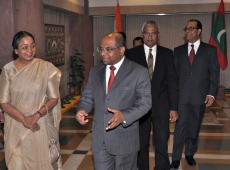India’s Elections Commission (ECI) and parliament are hosting respective delegations from the Maldives’ Elections Commission (ECM) and Majlis in an effort to ensure September’s presidential elections are conducted in a “free, fair and credible manner”.
A seven member delegation from the Elections Commission of the Maldives (ECM) is in India for six days as part of a cooperative program with the Elections Commission of India (ECI) to enhance the Maldives’ capacity to hold the upcoming presidential and local council elections.
While in India, the ECM has the opportunity to acquire first-hand experience during the Karnataka state assembly elections. The ECI is also organising a special election-related training module for the ECM in Mysore.
ECM President Fuad Taufeeq is leading the delegation, which includes other ECM senior officials. Prior to departing for India on May 4 the Maldives’ delegation met with the High Commissioner of India Rajeev Shahare to discuss the visit and other election related issues.
The ECM delegation is expected to return May 9.
Meanwhile, a Maldivian parliamentary delegation led by Parliament Speaker MP Abdulla Shahid is also in India and met with Indian Parliamentary Speaker Lok Sabha Smt. Meira Kumar yesterday (May 6).
Kumar assured the visiting delegation that India would extend “all possible assistance” – in close coordination with the ECM – to ensure the September presidential elections are conducted smoothly and peacefully.
She expressed her hope that elections may be held in a free, fair and credible manner.
Kumar said that India and Maldives enjoy “special and time tested relations” and reiterated India’s continued commitment to further strengthen and diversify the bilateral relationship. Along those lines, she emphasised the collective task both nations have to create an atmosphere of “strong understanding and interdependencies” in the region to achieve collective progress and prosperity.
 Kumar also stressed the need to further strengthen bilateral parliamentary linkages, with the first meeting of the India–Maldives Parliamentary Friendship Group being held during the Maldives delegation visit, acting as a “step in the right direction”.
Kumar also stressed the need to further strengthen bilateral parliamentary linkages, with the first meeting of the India–Maldives Parliamentary Friendship Group being held during the Maldives delegation visit, acting as a “step in the right direction”.
The Maldivian government was urged to take measures for establishing investor confidence in the country as well as conduct structural reforms to prevent harassment and improve living conditions for the nearly 30,000 strong Indian expatriate workforce.
Shahid assured Kumar that the Maldives would work closely with India for the mutual benefit of both nations and extended an invitation for the India’s parliamentary speaker to visit the Maldives.
“Electoral background discouraging”: Transparency report
The 2013 presidential elections are set to unfold “against a context of uncertainty, crises of political legitimacy and unprecedented levels of political polarisation,” Transparency Maldives has stated, in an extensive pre-election assessment published on March 28.
The detailed report identifies key challenges in the lead up to the election, such as the candidacy of former President Mohamed Nasheed, lack of monitoring of campaign financing, an extensive and entrenched culture of vote buying, and a media establishment set on fueling personality politics and further polarisation.
The ECM said in mid-March it had noticed a surge of discrepancies on membership forms submitted by certain political parties including forged documents, forms with false information and even forms filed under the names of dead people.
“Buy-offs and civic education” challenges: ECI
The current ECM visit to India is part of a joint assistance project agreed upon in early-March during ECI’s eight day visit to the Maldives to study the electoral environment in an effort to enable free and fair elections.
During the ECI’s visit, they identified areas the ECM needs to develop and improve. These included: staff shortages, training needs, and the lack of information technology software. Vote buying is another important issue being addressed, the ECM’s President Fuad Thaufeeq previously explained to Minivan News.
Speaking to Minivan News at the time, India’s Deputy Election Commissioner Dr Alok Shukla said that preventing voter “buy-offs” and improving civic education were two “big” challenges about which the ECM was “extremely concerned”.